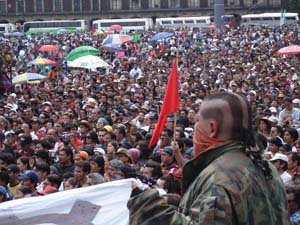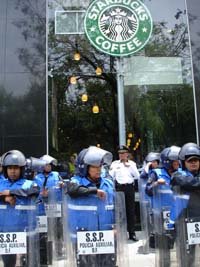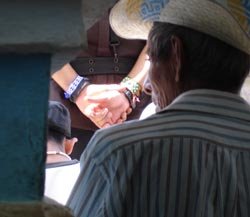The Struggle for Everything
 [photo: Zocalo, Mexico City, May 1, 2006]
[photo: Zocalo, Mexico City, May 1, 2006][This was a blog entry I prepared before the events in Atenco took place. I’m going to put it up here because some of the same themes are coming up again now, only with a greater intensity in light of the now clear willingness of the state to use a cruel and unrestrained violence to stop this movement. In Atenco-related news, some prisoners have been released and with new testimonies from both within and outside of the prison, the evidence accumulates with proof of the rapes, sexual assaults, and brutality waged by the police—and not in the heat of the moment; there was no resistance in Atenco May 4 when 3,000 police—this number now confirmed—entered Atenco and hauled people out of their houses. The police not only carried guns that day—something denied for weeks by officials—but also condoms. The content and brutality of the attack was not only premeditated, it came as an order from above.
 [photo: Police guarding Starbucks during May 1, 2006 march in Mexico City]In Mexico City and around the country the resistance continues, in road blockades, marches, sit-ins, strikes, occupations, etc. Tomorrow (Friday the 19th) in Mexico and around the world actions will take place in every place and every “way” chosen by adherents and supporters of the Other Campaign, followed by a week of information diffusion and mobilization culminating in the massive Mexico City march with the participation of contingents from all over Mexico May 28th].
[photo: Police guarding Starbucks during May 1, 2006 march in Mexico City]In Mexico City and around the country the resistance continues, in road blockades, marches, sit-ins, strikes, occupations, etc. Tomorrow (Friday the 19th) in Mexico and around the world actions will take place in every place and every “way” chosen by adherents and supporters of the Other Campaign, followed by a week of information diffusion and mobilization culminating in the massive Mexico City march with the participation of contingents from all over Mexico May 28th]. *************
“It is not possible to construct indigenous autonomy without a radical transformation of the system,” The EZLN has repeated in many spaces of the Other Campaign. “Not only is it not possible, it has a deadline.” If everything continues above as it is and we continue divided, separated, they continue, we will be destroyed. If we do not manage to create an alternative, an anticapitalist alternative, that creates something else at the same time as it destroys what is above, there will not be anyone left with whom to create solidarity, not people to fight with nor a struggle to fight….” Subcomandante Insurgente Marcos
The are several important themes of the Other Campaign here at work: the radical transformation of the system, the biopolitical nature of the struggle, and the deadline.
First, briefly on the necessary radical transformation of the system, Kilombo North Carolina wrote me the other day observing that in many of the commentaries that were coming out in national and international opinion pieces, there are those that think this, the Zapatista struggle and the movement proposed by the Sixth Declaration and the Other Campaign, will be resolved if the San Andres Accords are passed into legislation. Or, in another example, there are the sectors in Mexico and the US that put primacy and priority into organizing electoral monitoring teams to ensure the “fairness” of the elections and to guard against fraud, an honest and valid project but one that promises little if one intends social transformation, as if the proper operation of the ballot box ensured the legitimacy of the representative system. Neither new legislation nor proper electoral procedure has anything to say to this movement now. It is both simpler and bigger than this. We don’t want just to survive, we don’t want just recognition, we are not fighting for the basics, the Other Campaign declares, we want everything. (I’ll return to this later.)
 [photo: May 1, 2006 march, Mexico City]
[photo: May 1, 2006 march, Mexico City]The deadline is also a recurring theme. In response to a participant in one meeting who stated that the results of this struggle would be a long time in coming, that maybe we, those present, would not see the changes worked for in the Other Campaign, maybe not even our children, but rather our grandchildren would see and live these changes, Subcomandante Marcos replied, no compañero, I think we’re going to see it, and I think we’re going to see it in the next few years.
That “something is going to happen,” an economic crisis, a social explosion, a culmination of the multiple crises of the system of representation, of nation-state sovereignty, and an unequal global economy, is fact; whether we are ready for it or not, whether we are part of it or not, whether we contribute to its direction or not, it’s going to happen. The EZLN said this at the very first stop of the Other Campaign, in San Cristobal de las Casas, and in many states along the way: the system is going to fall; we can wait and see what happens or we can decide what happens next.
They specify: we don’t think it is a correct attitude to think that everything will disappear up there above, that it will self-destruct, and that we’ll be fine here, with our life vests. It has never been that way. We have to create something else if there is going to be something else…”if we are to return the earth its function as producer of fruits and nurturance instead of cancer and sickness.”
 [photo: Rally, Zocalo, Mexico City, May 1, 2006]
[photo: Rally, Zocalo, Mexico City, May 1, 2006]Kilombo NC was saying the other day, imagine if, when a moment of crisis hits, when the system of representation falls, like in Argentina, like in Bolivia, in Ecuador, in places that have been subject to harsh neoliberal reforms without the wealth or global positioning to cushion the blow, there is an organized alternative project there to meet it? What if there is the “Other Campaign?” [and in recent interviews this week, Marcos confirms: in the country right now we see the same signs we saw in 1992 when the (zapatista) communities voted to go to war. If there had been an Other Campaign then, we wouldn’t have had to rise up in arms in 1994.]
Sup Marcos in Colima: Imagine when we gather all this pain together, in a pacifist and peaceful struggle, not to return to something else, the nostalgia of (Pancho) Villa and (Emiliano) Zapata, but in what we can be now, what you…want to be, but with us, the EZLN, with others, with workers, with some you will never see or meet…
And in Aguascalientes: This conviction that we have in the Other Campaign that gives us the impulse to build this movement, is about creating something new. You all have a place, you, compañera housewife, you have a place. What we have gathered in our trajectory is the rage and indignation of this country, but now with different matrix. [and in this week’s discourse: “…but our rage won’t be the rage of before, the rage of always. No. Now it is an organized indignation, an other rage.”]
And in Morelia, Michoacan: “The days that are coming are going to be terrible, hard, dirty, low, like few times this country has seen. If we don’t do anything it’s going to be like that. And if we do do something, well it’s still going to be like that. But there’s going to be hope, the hope of something else, of another organization of organizations, of another movement that provides an exodus from this night that they are proposing to make, and now for real, eternal, in the only way that things can be eternal, with death….”

The deadline is not a mere milestone after which things are reorganized: “Before we thought [if the struggle didn’t go anywhere] we could continue in our poverty. What we’re seeing now is that this isn’t going to be possible. They are coming for us, for our land…” (Sup Marcos, El Rincon, Guerrero) and “...even our poverty they want to take away from us,” (Sup Marcos, Aguascalientes, Guerrero). In a simple explanation of biopower and biopolitics (Morelia): “The Other Campaign, to put in terms we all understand, is the struggle for life. And capitalism is the struggle to impose, on all of us, death, and it doesn’t matter to them that they destroy the same world that they themselves inhabit. As long as there’s profit it doesn’t matter that the water is contaminated, that nature destroyed, that communities are left abandoned and deserted. And we must not forget to give this the name is deserves: capitalism. It is the enemy, not just in Mexico but in the whole world. This struggle that we are generating is for humanity, because on the other side….they need war, and the only war remaining is one against humanity. If they win, we disappear. If we win, not only do we survive, but we live with dignity, liberty, democracy, and justice.”
Also in Morelia, Michoacan, “…As Zapatistas we think that for particular circumstances that we won’t discuss here, (that will be the job of the historians of the 21st century) this work is falling to Mexico. It’s not just our duty and our hope in this country, but in the continent and the rest of the world.
 If in some way Zapatismo has achieved a synchrony of global sympathy, it’s not because we have made certain use of the word, or because of the unquestionable heroism of the indigenous communities, but because from this moment it was proposing an alternative, the seed of something else. And this is what the Other Campaign means to do: name the enemy, capital, and the ally of this enemy, the political class….we mean the defeat of this government and the destruction of capital. And then, like someone said once, we will have only just won the right to start over…but we will have to start where one always has to start, from below.”
If in some way Zapatismo has achieved a synchrony of global sympathy, it’s not because we have made certain use of the word, or because of the unquestionable heroism of the indigenous communities, but because from this moment it was proposing an alternative, the seed of something else. And this is what the Other Campaign means to do: name the enemy, capital, and the ally of this enemy, the political class….we mean the defeat of this government and the destruction of capital. And then, like someone said once, we will have only just won the right to start over…but we will have to start where one always has to start, from below.”

0 Comments:
Post a Comment
<< Home